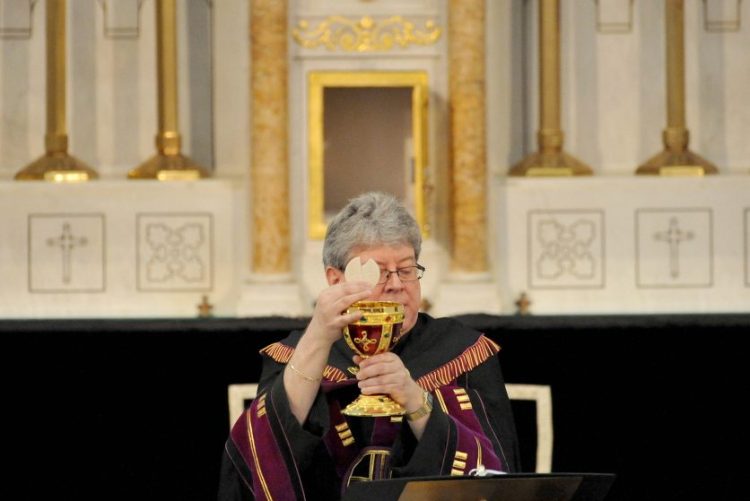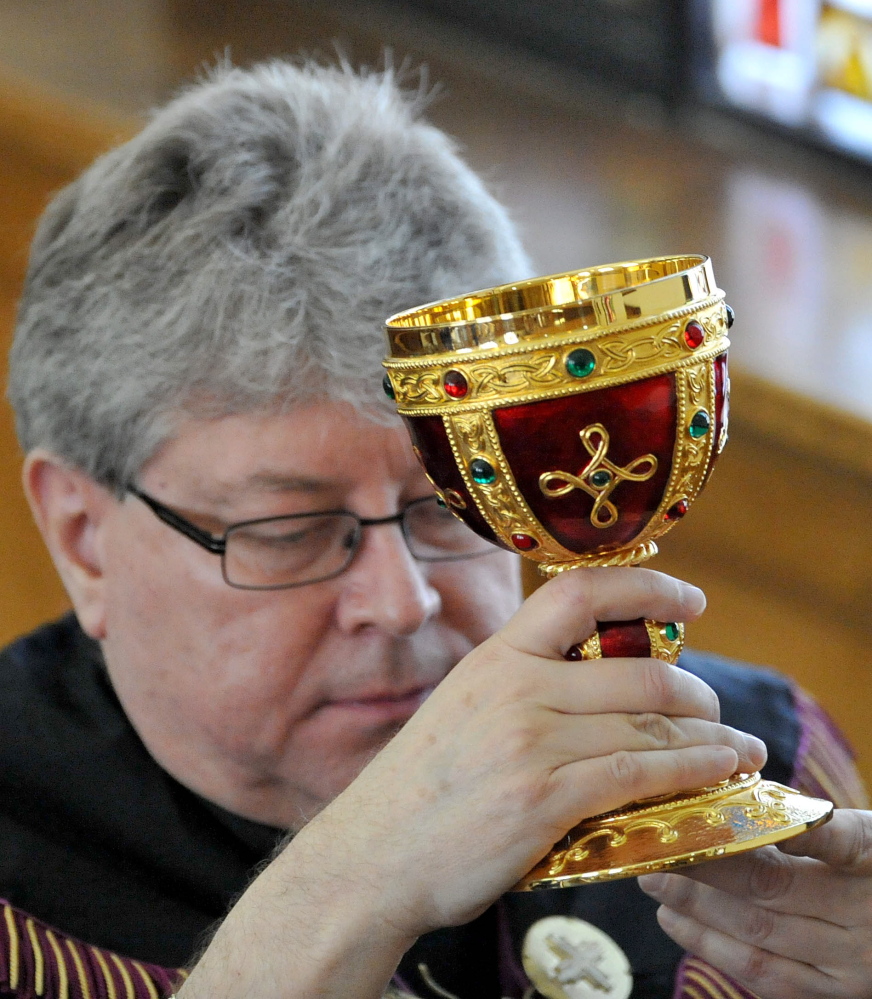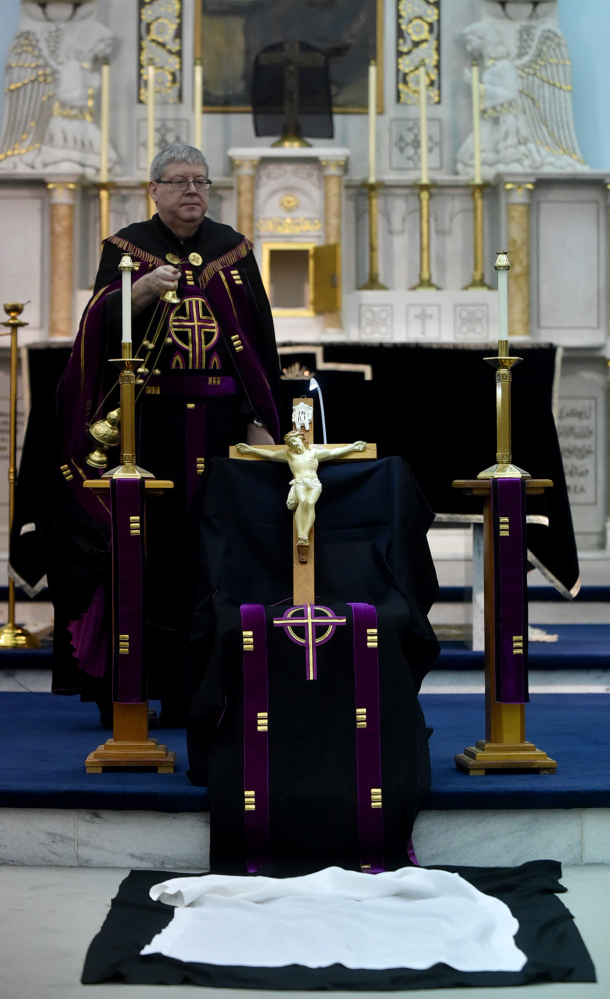WATERVILLE — Experts who deal with sexual abuse issues say it is understandable that parishioners of St. Joseph Maronite Catholic Church are in shock and disbelief that their former priest, the Rev. Larry Jensen, was removed swiftly from the church amid allegations that he sexually abused a teenage boy 15 years ago in Connecticut.
After all, a spiritual leader is someone they look up to, trust, admire, invite to family gatherings and holiday celebrations, and regard as part of their family. But it is for that precise reason that often people can not imagine any abuse could have taken place, experts say.
Cara Courchesne, communications director for Maine Coalition Against Sexual Assault, cited as an example the case of former Penn State University defensive coordinator Jerry Sandusky, who sexually abused young boys over a period of at least 15 years.
“I think that with a lot of cases, and we saw it with Jerry Sandusky, that when somebody who is part of a community, who is well-known and well-liked and something like this comes out, it makes us question our own beliefs and what we know to be true and it can be very, very hard,” Courchesne said.
Jensen, 62, was the priest at St. Joseph for 10 years until Sunday, when Bishop Gregory Mansour, of the Maronite Catholic Eparchy of Saint Maron, of Brooklyn, New York, read aloud a letter in the church saying Jensen had been removed from his priestly ministry and that the Rev. James Doran would be replacing him.
Michael Thomas, vicar general of the Brooklyn Eparchy, said he confronted Jensen about the alleged abuse of a 17-year-old in Danbury, Connecticut, and Jensen did not deny it.
Thomas said Tuesday that the eparchy had not received any additional reports of sexual abuse by Jensen since Sunday’s announcement. The church had asked anyone else who might have been abused to report it to authorities.
Meanwhile, parishioners continue to mourn the loss of Jensen, whom they trusted, and look toward healing in their church.
“He’s a good man and I hate seeing this happen to him, but there are rules and regulations,” Dale Sturtevant, a 45-year member of St. Joseph’s, said Tuesday. “There’s no variation on the predatory scale.”
Sturtevant said the new priest, Doran, celebrated Mass on Tuesday morning and parishioners got to meet him.
“He’s going to be a healing priest, and that is a good thing because that’s what we need,” Sturtevant said. “That was my gut feeling. You could tell when he did the Mass. I was really angry with the church, very angry. I do not like the way the system is rigged with no forgiveness, and I actually asked Bishop Gregory when I saw him on Sunday, ‘Are my sins now not forgiven? Why can’t the church forgive Father?'”
Thomas said Tuesday that he feels badly if parishioners have the impression that Jensen was removed from priestly ministry without cause.
“Father could have denied it and he did not, and that’s why everything moved kind of quickly, because of his maturity and his honesty, so I greatly respect him (for that),” Thomas said, adding that said he believes Jensen was being truthful by not denying the abuse. Thomas had said that the case involving the 17-year-old was the only one Jensen was involved in and he (Thomas) had no need to doubt that.
Thomas said a priest usually is removed temporarily, pending an investigation, “but we didn’t have to do that in this case because Father didn’t deny the allegation.”
Thomas said the person identified as the abuse victim was a male who was nearly 18 years old, and it occurred when Jensen was a priest at St. Anthony Maronite Catholic Church in Danbury, Connecticut. He worked in that church for eight years before coming to Waterville. Before serving at St. Anthony, he served 10 years at St. Michael the Archangel Maronite Catholic Church in Fayetteville, North Carolina, according to Thomas.
Attempts to reach Jensen have been unsuccessful and Thomas said he does not know who his accuser is. An attorney reported the alleged abuse to the Roman Catholic Diocese of Bridgeport, which then notified the Brooklyn Eparchy, the Connecticut Department of Children and Families and Danbury police.
Messages left Monday and Tuesday for a detective-lieutenant in charge of such investigations at the Danbury Police Department were not returned, and a message left Tuesday for his supervisor also was not returned.
NOT FORGOTTEN
It is important to recognize that there are people who have committed crimes and are upstanding members of the community and have done good in a community, Courchesne said, but that doesn’t mean sexual abuse is OK. While the abuse is alleged to have taken place 15 years ago, for those affected, it can seem like yesterday.
“It’s not forgotten to the person who he perpetrated the abuse against,” Courchesne said. “It’s not forgotten to the person’s family, for the people in the person’s community. I think that what we’ve learned through a variety of cases like this with the sexual abuse issues that the Catholic Church has experienced is that it doesn’t just go away. It is something that keeps coming back.”
Melanie Sakoda, a member of the board of directors of the Survivors Network of Those Abused by Priests, said that while she does not have information about the Waterville case, it is important that people look at the fact that the church permanently removed Jensen from priestly ministry, mandating that he not present himself as a priest anymore.
“That’s a sign,” Sakoda said. “They didn’t do that easily, in my experience, but that’s something the parishioners should be looking at.”
Like Courchesne, Sakoda said the argument that the abuse by Jensen happened long ago and should be forgotten is disturbing.
“It may have been in his past, but if a child is sexually abused by a clergyman, that can leave lifelong scars, so it’s not in that survivor’s past. It’s in his present,” she said.
Also, parishioners must be careful about defending Jensen in public, as young people who might have been abused would be less likely to report it if elders claim the allegations are false, according to both Courchesne and Sakoda.
“That’s really why we urge people: If you are going to support a priest, support him privately, not publicly,” Sakoda said.
She said it is important for people to show they are open to the possibility that the allegations are true.
“If you come forward too strongly and say, ‘Oh, he didn’t do it,’ is a child going to feel comfortable in saying, ‘Mom, Dad, it happened to me too’?”
Sakoda said that in the past, children would be punished for telling their parents they had been abused by a priest.
“The parents would say, ‘How dare you say that about Father?’ That’s what you don’t want. You should want to know the truth, even if it’s painful.”
COMPLEX REACTIONS
Sakoda, who is a volunteer in her roles as a SNAP leader and board member, maintains a website that tracks abusers in the Eastern Rite churches. The Maronite church in the U.S., she said, unlike the Roman Catholic communion, is a tiny group.
“Everyone likely knows everyone and can be related by blood, marriage or as godparents, godchildren. In my experience, such tightly knit communities make it more difficult for victims to come forward,” she said.
Sturtevant, the 45-year parishioner, said she has had deaths in her family recently, including that of her husband, and Jensen was helpful to her in the grieving process.
“I’ve been praying for Father Larry,” she said. “He was my godsend. I feel like I’ve just been confronted with another death, losing Father Larry, because he was there to comfort me and he was my friend and it hurt terribly.”
Sturtevant said about 75 people regularly attend Sunday services at the church, and on a holiday such as Easter, the church is packed with about 200 people.
Mitchell Garabedian, a Boston attorney who was been involved in more than 2,000 cases involving sexual abuse in the Catholic Church, said the focus of church officials should be on sympathy and caring for the victim.
“The child was a minor,” he said. “… That is against the law, immoral and very harmful to the victim.”
Both Courchesne and Garabedian said that parishioners often react with disbelief to allegations of abuse by their priest, and while some come to accept the reality of it, others do not.
“I think that the lesson from all of this is that these are complex crimes,” Courchesne said, “and there are complex reactions to them.”
Amy Calder — 861-9247
Twitter: @AmyCalder17
Comments are not available on this story.
Send questions/comments to the editors.





